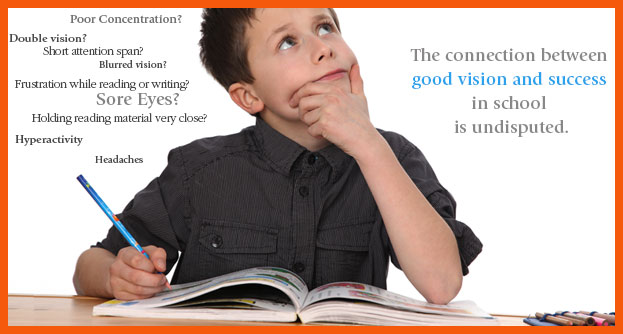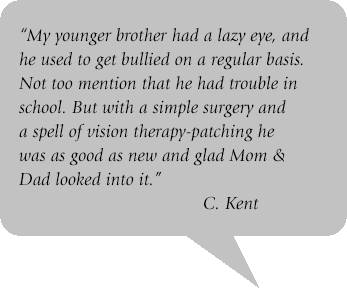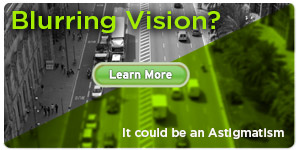
The connection between good vision and success in school is undisputed. Experts say that about 80 percent of what a student learns in school is information that is presented visually. We live in a visual world. So good vision is essential for a student of any age to reach his full potential and find success in the school setting.
 |
If your child is not succeeding in school, ruling out vision problems should be one of your first steps. Our doctors have the skills and expertise to identify if a vision problem is interfering with your child’s ability to access information and participate fully in school and in after-school activities. |
Your child may be nearsighted (can’t see far away objects like a blackboard), farsighted (can see objects that are close such as reading a book) and have an astigmatism (a blurring caused by the eyes inability to focus light appropriately).
Watch for these symptoms in conjunction with school challenges:
- Headaches or eye strain
- Blurred vision or double vision
- Crossed eyes or eyes that appear to move independently of each other
- Dislike or avoidance of reading and close work
- Short attention span during visual tasks
- Turning or tilting the head to use one eye only, or closing or covering one eye
- Placing the head very close to the book or desk when reading or writing
- Excessive blinking or rubbing the eyes
- Losing place while reading, or using a finger as a guide
- Slow reading speed or poor reading comprehension
- Poor eye-hand coordination
Having your student’s eyes checked is fast, easy and can relieve a lot of worry and guess work as you help to have him succeed in school.
Learn More
-
Children's Vision Video
Early professional eye care for children is highly recommended – even before kids start school. Watch this short video to see why. -
Vision Therapy for Children
An individualized program of eye exercises and other methods can treat non-refractive vision problems such as eye alignment and lazy eye. -
Children's Vision – FAQ's
How often should your child's eyes be examined? What's the difference between a school vision screening and a comprehensive eye exam? and more. -
Your Infant's Visual Development
Knowing the expected milestones of your baby's vision development during their first year of life can ensure your child is seeing properly and enjoying their world to the fullest. -
Are Contact Lenses a Good Choice for Kids?
Contact lenses offer advantages in the areas of sports and self-esteem. But when is your child old enough for contacts? -
Learning-Related Vision Problems
The first step is to make sure your child has 20/20 eyesight. But there are other, less obvious learning-related vision issues you should know about as well. -
Controlling Nearsightedness in Children
Certain types of contact lenses and eyeglasses may play a role in slowing the progression of myopia, or nearsightedness.




